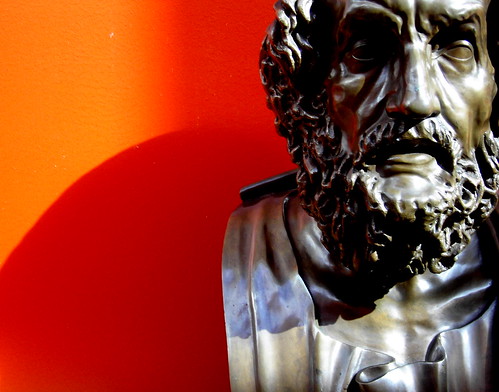 |
| Photo Credit: Myth Image |
Most scholars today believe that the Trojan War was a true historical event, one which probably occurred around 1250 BCE. The war was memorialized in many myths and epic poetry from ancient Greece. The stories were apparently written down for the first time roughly five hundred years after the war. The most famous telling of the war is, of course, Homer's The Iliad. (In my own reading of this story, I have relied principally on the fine translations by Robert Fagles
Although Homer placed his story in a real historical setting, the epic of The Iliad is in no way an attempt at early history. Nor is it simply a retelling of myths that surround the Trojan War. We don't hear about the abduction of Helen or the Trojan Horse, both events which may be rooted in history but are often believed to be mythic stories. We don't hear about the initial volleys or early battles. We don't even learn how the war turns out at its conclusion.
Instead, what Homer gives us is an enormously personal story of one man's emotional battles--and his personal transformation--during the course of one short episode in the war. While Achilles was a mighty warrior, his physical strength is not at the core of the plot. Instead, Homer focuses on his character's changing sense of rage and pain.
Achilles struggles with three kinds of rage over the course of the book:
1. Rage against Agamemnon:
When the Greeks capture a Trojan-allied town, they enslave two women to be companions for commander-in-chief Agamemnon and his prized warrior Achilles. When Agamemnon is forced to return his slave to her family, he claims Achilles's woman, the beautiful Briseis, as compensation. Achilles is furious. Some modern readers argue that his anger is rooted in real love for Briseis. Others feel his rage is simply an expression of his wounded pride at having his reward stripped from him. The anger of Achilles comes to such a boiling point that he refuses to reenter the battle against the Trojans until his concubine is returned. Whether his pain is mostly from the loss of love or the loss of respect, Achilles feels his honor has been acutely insulted by Agamemnon.
2. Rage against Hector:
While Achilles stays in his tent away from the battlefields, his beloved friend Patroclus enters the war clad in the armor of Achilles. He and the Myrmidons fight valiantly and successfully--so successfully that Apollo steps in to prevent Patroclus from gaining more honor than the gods have decreed. Seeing this new weakness, Hector (fighting on the side of the Trojans) puts his sword through Patroclus and kills him. Now, Achilles is drawn into the battle by his fury towards Hector (and perhaps his own shame for putting his friend's life in such danger). Revenge rather than wounded pride motivates his rage now.
3. Rage against fate and expectations:
Finally, Achilles must struggle against the fact that his culture casts him as a great warrior who will be sacrificed in war. His mother Thetis, a goddess, tells Achilles that he has a choice: stay in Troy where he will be killed in the war but be remembered forever as a great hero, or go home and live a long and ordinary life. That is, Achilles must choose between a long life that leads to anonymous death, or a death that leads to everlasting life. In his rage at this unfair choice, he considers the option to go home without victory. Eventually, however, Achilles comes to terms with his impending death in battle and joins the fight.
I will talk about each of these in more detail over the course of the week, as well as how Achilles comes to the point of redemption in each of these situations. Join me as I try to make sense of how Homer is shaping our conceptions of war and humanity, as well as how he is contributing to the Great Conversation--a conversation that in many ways started with his voice.
* * *
Don't miss Tony's clever tribute to Homer and the Iliad. And be sure to follow the blog posts all over the web inspired by this month's Classics Circuit theme of Ancient Greek Literature.

























